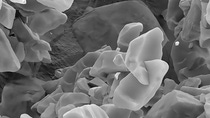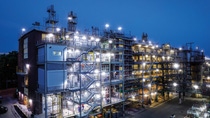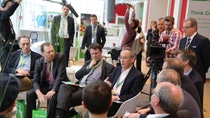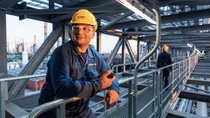Sustainability
What's New
Latest News
結果: 485
BASF Research Press Briefing 2025: How innovations drive BASF’s success
“Innovation has always been part of BASF’s DNA. Especially in these volatile times, it is crucial to leverage our innovative strength to develop competitive solutions that differentiate us as a company in our markets and give us a competitive edge,” said Dr. Stephan Kothrade, Member of the Board of Executive Directors of BASF and Chief Technology Officer, at the company’s Research Press Briefing held today. To achieve this, BASF implemented its “Winning Ways” strategy about a year ago with the clear goal of becoming the preferred chemical company to enable its customers’ green transformation. “Our ambition extends beyond making BASF green. We aim to inspire customers to choose BASF as their trusted partner for their future success,” Kothrade said.

Nobel Prize for MOFs: Nanostructures enable large-scale extraction of carbon dioxide from the air
BASF produces metal-organic frameworks (MOFs) for CO₂ capture on an industrial scale. These nanostructures can absorb large quantities of molecules on their surface. For the development of these MOF structures, the Royal Swedish Academy of Sciences in Stockholm will award this year’s Nobel Prize in Chemistry on December 10, 2025.

BASF launches xarvio ® FIELD MANAGER For Grapes
Cologne, Germany - BASF Digital Farming launches xarvio FIELD MANAGER For Grapes, providing growers of wine grapes in France, Spain, and Türkiye with access to proven plant, pest, disease, fertilization and irrigation models that measurably improve crop health, while optimizing resources and reducing environmental impacts. The tool marks a major leap forward in the global digitalization of viticulture.
BASF adds ISCC EU certification to certified biomass-balanced methanol portfolio
BASF has broadened its offering for certified biomass-balanced methanol products by adding the ISCC EU certification to its existing portfolio. Since mid-2025, BASF’s Intermediates division has been supplying biomass-balanced methanol that is certified under ISCC EU, enabling BASF to meet the full range of certification requirements across both the chemical and biofuel sectors. For the chemical industry, methanol is certified under the ISCC PLUS and REDcert² standards, while ISCC EU and REDcert-EU certifications address the specific regulatory needs of the biofuel sector. This comprehensive certification framework allows BASF to support its customers in different industries to achieve their sustainability goals and comply with regulatory requirements.

BASF and ExxonMobil Join Forces to Advance Low- Emission Hydrogen Through Methane Pyrolysis Technology
LUDWIGSHAFEN, Germany, and HOUSTON, USA – November 17, 2025 – BASF and ExxonMobil have formed a strategic collaboration to advance methane pyrolysis technology, a next step toward delivering efficient, cost-competitive low-emission hydrogen solutions for industrial use. The companies have signed a joint development agreement to co-develop methane pyrolysis technology, including plans to construct a demonstration plant aimed at commercial readiness.



